Introduction
Scholarships play an essential role in making higher education affordable and accessible to students worldwide. With rising tuition costs and increased competition for spots at top universities, understanding the different types of scholarships available in 2025 can help students strategically apply and significantly improve their chances of securing financial aid. Whether based on merit, financial need, or specific talents, scholarships provide invaluable opportunities to relieve the financial burden of education.
This guide explores the various types of scholarships available in 2025, including eligibility criteria, benefits, and practical tips to increase your chances of being selected.
Types of Scholarships
1. Merit-Based Scholarships
Description:
Merit-based scholarships reward students for exceptional academic achievements, leadership skills, or significant accomplishments in extracurricular activities. These scholarships aim to support high-performing students who excel in their studies and other pursuits.
Eligibility Criteria:
- High GPA: Typically, above 3.5 on a 4.0 scale.
- Strong Extracurricular Involvement: Participation in sports, arts, volunteering, etc.
- Leadership Roles: Proven leadership in school or community organizations.
- Standardized Test Scores: SAT, ACT, GRE, etc. may be required.
Example:
- National Merit Scholarship (USA): Recognizes students with exceptional PSAT scores and academic performance.
- Rhodes Scholarship (UK): Provides full funding for outstanding students to study at the University of Oxford.
Who Should Apply: Students with strong academic backgrounds, leadership qualities, and a proven track record of extracurricular involvement.
2. Need-Based Scholarships
Description:
Need-based scholarships are designed for students who face financial constraints and might not otherwise afford higher education. These scholarships ensure that financial barriers do not limit access to educational opportunities.
Eligibility Criteria:
- Proof of Financial Hardship: Income statements, tax documents, etc.
- Good Academic Standing: Maintain satisfactory academic performance.
- Application Forms: FAFSA (Free Application for Federal Student Aid) in the U.S. or similar documents for other countries.
Example:
- Federal Pell Grant (USA): Provides financial aid to low-income undergraduate students.
- Commonwealth Scholarship (UK): Supports students from developing Commonwealth countries.
Who Should Apply: Students who come from low-income households or face significant financial need.
3. Athletic Scholarships
Description:
Athletic scholarships are awarded to students who have exceptional skills in sports. Universities offer these scholarships to attract talented athletes who can represent their institutions in competitive sports.
Eligibility Criteria:
- Strong Athletic Record: Achievements in competitive sports.
- Recommendation from a Coach: Often required for eligibility.
- Academic Eligibility: Based on NCAA or institution-specific guidelines.
- Participation in Competitive Sports: Must have participated in and excelled at a recognized level of competition.
Example:
- NCAA Division I & II Scholarships (USA): Provides full or partial funding to student-athletes.
- UK Sports Scholarships: Offered by universities like Loughborough and Bath to elite athletes.
Who Should Apply: Talented student-athletes who wish to pursue their academic careers while competing in sports at the university level.
4. Minority Scholarships
Description:
Minority scholarships aim to support underrepresented groups in higher education, promoting diversity and inclusion. These scholarships help ensure that students from minority backgrounds have access to educational opportunities.
Eligibility Criteria:
- Belonging to a Minority Group: Ethnic, racial, or social groups underrepresented in higher education.
- Commitment to Community Development: Engagement in community or cultural activities.
- Academic and Financial Need: Some programs require both.
Example:
- United Negro College Fund (UNCF) Scholarships (USA): Supports African American students.
- Hispanic Scholarship Fund (HSF): Provides financial aid to Latino students in the U.S.
Who Should Apply: Students from underrepresented ethnic, racial, or social groups who are committed to furthering education and enhancing community diversity.
5. Field-Specific Scholarships
Description:
Field-specific scholarships are targeted at students pursuing careers in high-demand sectors such as engineering, medicine, technology, and the arts. These scholarships aim to develop talent in areas where there is a shortage of qualified professionals.
Eligibility Criteria:
- Enrollment in a Related Degree Program: Must be pursuing studies in the targeted field.
- Academic Excellence in the Chosen Field: Top-performing students in the relevant academic discipline.
- Passion for the Industry: Demonstrated commitment to contributing to the field.
Example:
- Google Women Techmakers Scholarship: Supports women in technology and computer science.
- American Medical Association (AMA) Foundation Scholarship: Offers funding for medical students.
Who Should Apply: Students pursuing careers in fields with high demand, such as STEM or medicine.
6. Community Service Scholarships
Description:
Community service scholarships recognize students who have made significant contributions to their communities through volunteer work and leadership. These scholarships encourage social responsibility and reward those who actively work toward positive change in society.
Eligibility Criteria:
- Documented Community Service Hours: Evidence of volunteer or service hours.
- Recommendation from a Community Leader: A reference from someone who can vouch for your service work.
- Strong Personal Statement: A statement detailing the impact of your community service.
Example:
- Prudential Spirit of Community Awards (USA): Recognizes students committed to volunteerism.
- Equitable Excellence Scholarship: Rewards students with a history of community involvement.
Who Should Apply: Students who have demonstrated exceptional community engagement and a passion for making a difference.
- International Scholarships
Description:
International scholarships assist students in studying abroad or in their home countries with the support of government or institutional funding. These scholarships often encourage cultural exchange and global collaboration.
Eligibility Criteria:
- Strong Academic Record: Most programs require academic excellence.
- Proof of Admission: Applicants must show that they have been admitted to an international university.
- Language Proficiency: TOEFL/IELTS scores or proof of language proficiency may be required.
Example:
- Erasmus Mundus Joint Master Degrees (EU): Offers full scholarships for students studying in Europe.
- Fulbright Program (USA): Provides funding for international students wishing to study in the United States.
Who Should Apply: Students from non-EU countries seeking study abroad opportunities or those wishing to pursue international cultural exchange programs.
How to Choose the Right Scholarship
1. Evaluate Your Strengths
Identify your academic achievements, skills, and extracurricular activities. Are you an exceptional student, athlete, leader, or volunteer? Understanding your strengths will guide you to the most fitting scholarships.
2. Assess Your Financial Need
Determine the level of financial aid you need. If you require full funding, need-based scholarships may be your best option, while merit-based scholarships can be suitable for high-achieving students.
3. Match Scholarships to Your Career Goals
Align scholarships with your academic interests and career aspirations. For example, if you are pursuing medicine, look for scholarships in healthcare, while those in business may benefit from field-specific scholarships in economics or business studies.
4. Review Eligibility Requirements
Carefully check the eligibility criteria for each scholarship. Make sure you meet all the academic, financial, and extracurricular requirements before applying.
Tips for a Successful Scholarship Application
1. Start Early
Research and apply for scholarships as soon as possible. Many scholarships have strict deadlines, and starting early gives you ample time to gather documents and craft strong applications.
2. Tailor Your Applications
Customize each scholarship application to highlight your relevant skills, experiences, and strengths. A tailored application shows your dedication to the scholarship.
3. Write a Compelling Essay
If required, your essay should share a personal story demonstrating your passion for your field of study and your potential to make an impact.
4. Gather Strong Recommendations
Request letters from teachers, mentors, or community leaders who know you well and can provide personalized, impactful recommendations.
5. Proofread and Edit
Make sure your application is error-free. Grammar mistakes can hurt your chances, so use tools like Grammarly or ask someone else to review your work.
6. Apply for Multiple Scholarships
Don’t rely on just one scholarship. Apply for multiple scholarships to increase your chances of receiving financial aid.
Conclusion
Understanding the different types of scholarships available in 2025 can significantly enhance your chances of securing the financial aid you need. Whether you excel academically, athletically, or through community service, there’s a scholarship opportunity for you. By strategically selecting the right scholarship types, tailoring your application, and following the tips provided, you can maximize your chances of success.
Start your scholarship search today, and take the next step toward funding your education and achieving your career goals!


